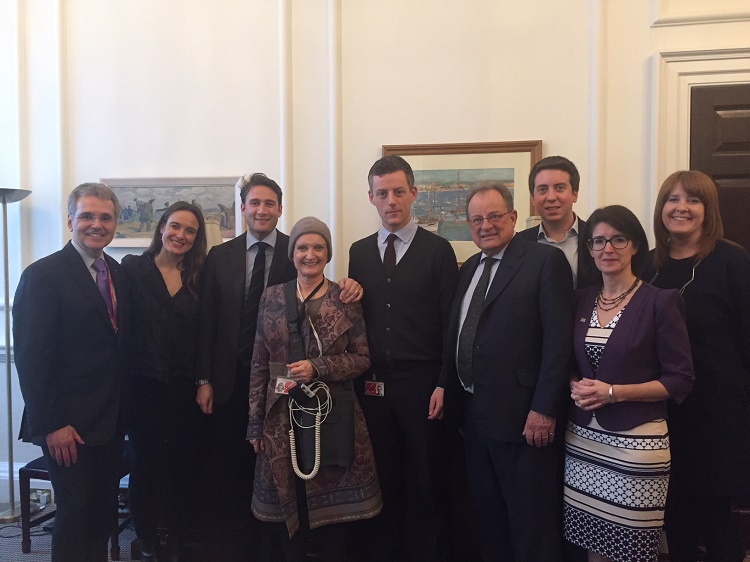Category: Research
-

Artificial Intelligence improves Brain tumour diagnosis
A new machine learning approach can classify gliomas, a common type of brain tumour, into low or high grades with almost 98% accuracy, researchers report in the journal IEEE Access.
-

Australia to begin ground-breaking trial in children with brain cancer
Australia is joining the clinical trial to test a new treatment in children with brain cancer. The trial will be led by Sydney Children’s Hospital.
-

An update on our research into children’s brain tumours
Researcher Todd Hankinson and his team at Children’s Hospital Colorado have studied biological differences between paediatric and adult ACP tumours
-

Committed to funding world-class research into brain tumours
COVID-19 has dramatically transformed the research landscape for our community but we remain driven to accelerate new treatments.
-

Our researchers develop new test to assess drugs to tackle childhood brain tumours
Researcher Till Milde and his team from the Hopp Children’s Cancer Center Heidelberg (KiTZ) have developed a new test system.
-

The National Institute for Health Research announces framework for restarting vital studies
The NIHR announced yesterday that they have published a framework for restarting research activities that have a been paused as a result of Covid-19.
-

Announcing the Tessa Jowell Centres of Excellence
This collaborative plan will award outstanding neuro-oncology centres ‘Tessa Jowell Centre’ status within weeks.
-

The Brain Race announces winning startups in position to defeat brain tumours
The Center for Advancing Innovation (CAI) announces winners of the Brain Race, an open innovation contest to advance high-impact inventions and solutions to defeat brain tumors.
-

Our co-funded study could see babies with brain cancer “spared chemotherapy”.
Scientists carried out a large-scale study of 241 infants from around the world.
-

A unique opportunity to engage with our world-leading research
Last week, our first lab tour of 2020 gave some of our supporters a chance to witness our funded research first-hand.
-

Development of a new blood test for GPs to accelerate early diagnosis.
An affordable, point of care blood test to diagnose brain tumours was announced today by The University of Bristol.
-

The future of European scientific research
On January 31, the UK formally left the European Union (EU). As a result, we have now entered into an 11-month transition period, as the future UK-EU relationship is negotiated.
-

The advances of AI in healthcare
In April, NHSX, the unit whose remit is to deliver the digital transformation of the health service, will begin running a new artificial intelligence (AI) Lab.
-

STELLAR clinical trial now recruiting brain tumour patients
The phase 3 clinical trial aims to study oral eflornithine as a possible new treatment for patients with recurrent anaplastic astrocytoma.
-

University of Manchester launches application for The Brain Tumour Charity Chair of Neuro-Oncology
This new role will establish and lead programmes in neuro-oncology and neuro-immunology, a step forward for our community.
-

AI beats humans at diagnosing brain cancer from tumour biopsies
Widely reported, the artificial intelligence diagnosis was faster than a pathologist, just…
-

Ground-breaking research technique to assess the aggressiveness of childhood brain tumours
Co-funded by us, Children with Cancer UK and Action Medical Research, the study from the University of Birmingham is the first of its kind.
-

DNA ‘flags’ could change children’s brain tumour treatments, say researchers
New diagnostic techniques are driving real change in treatments for childhood brain tumours, a study reveals.
-

Researchers hail ‘staggering’ increase in low-grade glioma survival thanks to earlier surgery
Reported in The Times this morning, thousands have benefited over the last ten years due to surgical improvements.
-

An AI blood test that could speed up brain tumour diagnosis
Reported at this week’s The National Cancer Research Institute (NCRI) conference, the innovative test could change the way brain tumours are diagnosed earlier.
-

Blood test could help to accelerate brain tumour diagnosis
Researchers have developed a blood test that could help identify people with a brain tumour, even if they have no clear-cut symptoms.
-

Children being denied new cancer drugs
A study released this morning revealed that too few children are receiving targeted drugs for their cancers
-

Toca-5 gene therapy clinical trial fails
Tocagen, an American gene-therapy company, announced the trial’s failure yesterday.
-

Your vote for innovation
For a limited time the voting is open to decide the semifinalists in our Brain Race, with the Centre for Advancing Innovation. Which discoveries do you want to see go forward?